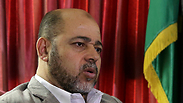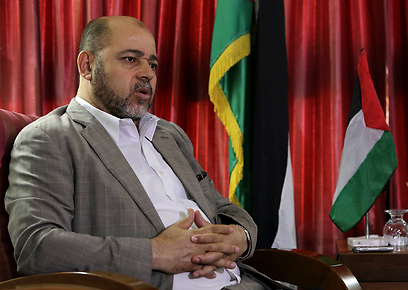
Moussa Abu Marzouk
צילום: AP
Hamas No.2 denies crisis in Palestinian unity effort
Moussa Abu Marzouk admits problems with Fatah-Hamas reconciliation, but says he will move his base in Egypt back to native Gaza.
The No. 2 leader of Hamas admitted Tuesday that the Palestinian unity government was faced with several problems, but that there was no crisis in the latest reconciliation effort.
Moussa Abu Marzouk also told The Associated Press that he hopes to move from his base in Egypt to his native Gaza Strip following last week's formation of the Fatah-Hamas cabinet.
He said that reconciliation efforts between his Islamic militant movement and Palestinian President Mahmoud Abbas would continue despite a new flare-up of tensions between the long-time rivals.
"There are problems, (but) it's not a crisis," Abu Marzouk said. "The reconciliation is ahead of us and the split is behind us. We are heading this way because reconciliation is the choice of our people. We have taken real steps and will continue."
The Palestinian political split broke open when Hamas seized Gaza from Abbas in 2007, leaving him with only the autonomous areas of the West Bank. The new Cabinet of technocrats is to administer both territories.
Related stories:
- Abbas' forces break up Hamas protest in West Bank
- Netanyahu: Those hoping for moderate Hamas were wrong
- Palestinian unity government sworn in at Ramallah ceremony
However, the road to reconciliation has been bumpy, with key disputes unresolved and the chain of command still unclear. Hamas remains the de facto power in Gaza, while the internationally backed Abbas is the main conduit for foreign aid.
Abu Marzouk came to Gaza from Egypt in April for reconciliation talks and said he now plans to move to Gaza permanently. "With God's help, I intend to stay," said the 63 year old, who was born in Gaza's Rafah refugee camp but spent his adult life in exile.
"Most likely, I will be based in Gaza," he said.
Abu Marzouk served as the top Hamas leader in the 1990s, but was replaced by the current leader, Khaled Mashaal.
Hamas, the Palestinian branch of the region-wide Muslim Brotherhood, has suffered a series of setbacks in the last three years, becoming increasingly isolated.
In 2011, the Hamas leadership in exile left its headquarters in Damascus after it refused to side with Syrian President Bashar Assad, a long-time patron, in the country's civil war. Hamas leaders found refuge in different Middle Eastern capitals, Abu Marzouk in Cairo and Mashaal in Doha. The break with Assad also hurt Hamas' ties with Iran.
In a further blow, the military removed the Brotherhood from power in Egypt last year. Egypt's new leaders vilified Hamas as a threat to domestic security and sealed Egypt's border with Gaza. The clampdown drove Hamas into its worst-ever financial crisis, forcing the movement to seek Abbas' help.
Abu Marzouk was key to negotiations with Abbas' Fatah movement on the composition of the unity government of technocrats formed last week.
However, tensions escalated in recent days.
In Gaza, Hamas forced banks to remain closed for the past week because of a dispute with Abbas over salaries for its loyalists. Hamas had hired more than 40,000 government employees during its seven-year rule of Gaza.
It's not clear if they will retain their jobs and who will pay them in the meantime. Abbas has suggested he is in no rush to find a solution. Meanwhile, some 150,000 Abbas loyalists on the public payroll are to continue receiving their monthly salaries.
Abu Marzouk said the crisis could have been avoided. "The text of the agreement calls for equality and fairness for the employees," he said.
Qatar promised help and the head of the Palestinian unity government, Rami Hamdallah, has been invited for talks to the Gulf state, Abu Marzouk said. "There should be an urgent payment to resolve the problem of the salaries," he said.











